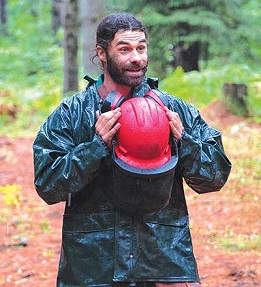
Meet MOFGA Volunteer Tim Libby
March 2020
By Holli Cederholm
Tim Libby spends most of his time in the woods: from the off-the-grid cabin he calls home in Union, Maine, to the thousands of acres of protected land he stewards as the forest and facilities manager at Midcoast Conservancy in Edgecomb. Most days he can be found at the conservancy’s Hidden Valley Nature Center in Jefferson. Here an active forest management plan is in place to balance the recreational use of a mix of pine, red and white oak, maple and birch – including miles of trails along with rustic camping sites – with the long-term health and economic viability of the forest. “We strive to manage up to 30 acres a year,” says Libby. With the direction of certified forester Barrie Brusila of Mid-Maine Forestry and cost-share funding from the Natural Resources Conservation Service, the center offers a working model of low-impact forestry. The ongoing timber stand improvement yields “funky” curved slab benches and tables, lumber and firewood, which are used on-site or sold as a fundraiser for the conservancy.
Libby credits his professional role in the woods to MOFGA’s Low-Impact Forestry (LIF) program. “Without my involvement with MOFGA, I wouldn’t be doing the work I’m doing today.” His experience gained with LIF, he feels, makes him a suitable caretaker for Midcoast Conservancy. He was first introduced to LIF in 2010 when he enrolled in a chainsaw safety course. An organic vegetable farmer, Libby had turned to the woods in pursuit of winter work that would complement his role cultivating tons of produce for hunger relief within the community. At the time he was a MOFGA journeyperson and the manager of Veggies for All, a food bank farm project he co-founded in 2008 and oversaw for nine years. Libby found that using a chainsaw and working in the woods came naturally to him. Born and raised in Maine, he was already acquainted with a whole host of hands-on skills, from carpentry to machinery maintenance. “Farmers tend to do a little bit of everything.”
He joined LIF’s Steering Committee in 2012, becoming the committee chair in 2014. Libby also volunteers as the Woodlot Area coordinator for the Common Ground Country Fair. Whether instructing a chainsaw safety workshop or hosting a demonstration in MOFGA’s woodlot, he notices that “people go away feeling empowered and convey that message.” He likes the way that sharing how to do something safely and efficiently can elicit excitement. In that regard, nothing compares to dropping a tree using the directional felling technique. Without fail, when exhibited at the fair, this technique results in astonishment among new and seasoned loggers alike. “They don’t know how they ever got a tree down before,” said Libby.
Libby can relate to the revelatory power of learning low-impact forestry. “One of the philosophies of the MOFGA community is the concept that we are trying to manage the land in a way that is respectful.” Before LIF, Libby had been applying this ethos through his work as a vegetable grower and has since expanded it to the forest. “I don’t want to be destructive. I want to be constructive … that’s the type of management that LIF advocates.”
